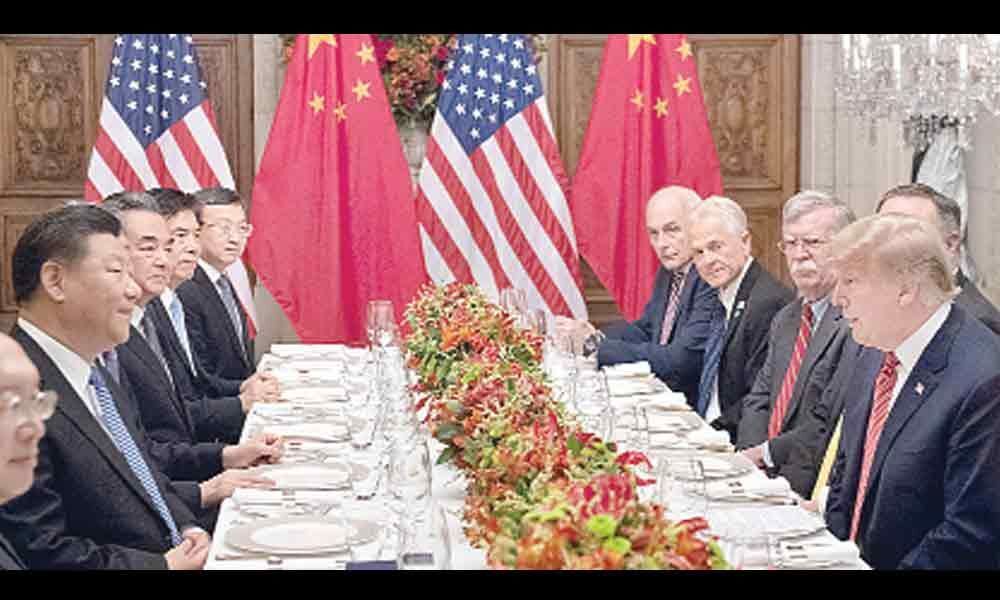India likely to benefit from US-China trade war

A report by US trade body says year-long trade war pushing US companies to source more from GSP countries
Washington: America's year-long trade war with China is pushing US companies to source more from GSP countries such as India, Thailand, Cambodia, Indonesia and Turkey, a report said on Tuesday, warning that cancelling GSP benefits to India would only help China.
The Coalition for GSP, a group of American companies and trade associations, in a report said the latest official trade figures shows that the Generalised System of Preference or GSP saved American companies $105 million in March, an increase of $28 million (36 per cent) from March 2018 and the second-highest level on record.
In the first quarter of 2019, the GSP saved American companies $285 million. That is $63 million more than the first quarter of 2018 - itself a record-shattering year.
The GSP is the largest and oldest US trade preference programme and is designed to promote economic development by allowing duty-free entry for thousands of products from designated beneficiary countries like India.
On March 4, President Donald Trump announced that the US intends to terminate India's designations as a beneficiary developing country under the GSP programme. The 60-day notice period ended on May 3.
According to the Washington DC-based Coalition for GSP, products hit by Section 301 tariffs when imported from China account for 90 per cent of increased GSP imports in 2019. Overall, GSP imports rose by about $760 million, with $672 million coming on products on China Section 301 lists.
GSP imports of products on those Section 301 lists increased 19 per cent while GSP imports of other products increased by just five per cent.
Noting that imports from China, subject to new tariffs, are down significantly, the coalition said countries from which GSP imports of products on China Section 301 lists have increased the most in the first quarter of 2019.
According to the report, India benefits the most from this. "For India, 97 per cent of increased 2019 GSP imports are on the China Section 301 lists.
GSP imports on Section 301 lists increased by USD 193 million (18 per cent), while imports of everything else increased by just USD seven million (two per cent)," it said.
Similarly for Turkey, 97 per cent of increased 2019 GSP imports are on the China Section 301 lists. For the Philippines, GSP imports of products on China 301 lists growth helped offset declining GSP imports of all other products.
South Africa, Brazil and Egypt saw similar increases in Section 301-affected products offset losses of other products, it said. The GSP imports from Indonesia grew only twice as much on affected products, the report said.
Yet, even here, growth rates are faster for products on the Section 301 lists: GSP imports of products affected by new China tariffs grew by 22 per cent, while imports of other products grew by 15 per cent.
"Not only would terminating GSP for India, Turkey or others under review (Thailand, Indonesia) hurt many American companies and workers that have relied on GSP for years, it would also reduce viable sourcing options for companies looking to buy less from China in response to Section 301 tariffs -- thereby undermining the president's own objectives," the coalition said.
In another report, the coalition said cancelling the GSP for India would benefit China. Referring to the results of a recent survey, the coalition said 30 per cent of companies would look to source more from China if GSP benefits went away.
That was about the same share of companies reporting they would source more from any of the approximately 120 remaining GSP countries and much higher than those would source more from non-China, non-GSP countries (NAFTA, EU, Japan etc.).
While President Trump has tweeted about raising tariffs on China to create additional negotiating leverage, terminating GSP for India would undermine it, the report said.
For some products such as luggage, simultaneously ending GSP for India and raising List 3 tariffs from 10 per cent to 25 per cent would make Chinese products more competitive compared to India, not less, it said.
That is because there is a significant overlap between products imported from India under GSP and Chinese imports targeted by the Administration for Section 301 tariffs, it said.














